In the history of the Indianapolis 500—since 1911—there have been just nine female drivers; there has never been a female medical director for INDYCAR and the Indianapolis Motor Speedway (IMS)—until now.
Julia Vaizer, MD, assistant professor of clinical emergency medicine at Indiana University School of Medicine, will be leading emergency medical services on race day for drivers, pit crews, IMS staff and fans. On May 28, the speedway will become Indiana’s “second largest city” as more than 350,000 people converge for the “greatest spectacle in racing”—making its population larger than Fort Wayne, Evansville and South Bend.
Every medical emergency that happens in a large city—heart attacks, strokes, diabetic emergencies, injuries and more—is expected. Add to that on-track collisions and substance-related emergencies among spectators, and it’s easy to see why an expansive medical care team is essential.
As the first graduate of the Motorsports Medicine Fellowship at IU School of Medicine, Vaizer was the logical choice to succeed longtime medical director and motorsports medicine pioneer Geoffrey Billows, MD, who retired in November 2022 after 30 years with INDYCAR. His protégé, Vaizer, has worked alongside Billows with the American Medical Response (AMR) Safety Team for the last three years.
“She is the first person in the world that has completed a university-based postgraduate fellowship in motorsports medicine,” said Billows, who founded the program in 2020. “As far as I know, she’s also the only female medical director of a major motorsports series such as INDYCAR. We gave her a good knowledge base, and, having watched her along the way, I have every confidence in her.
“She is very enthusiastic, has a lot of energy, is a very quick learner, and she’s not afraid to work hard,” added Billows. “Like me, she loves motorsports, and she genuinely cares for the drivers and all of the other folks we travel with and take care of.”
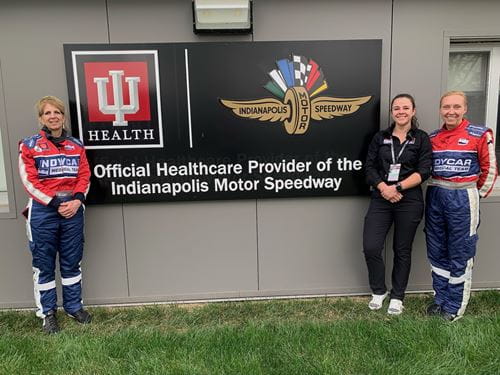 Vaizer is joined at the track by associate medical director, Angela Fiege, MD, another pioneer in motorsports medicine. Fiege brings experience as a longtime on-track and infield care center physician with NASCAR and INDYCAR. In 2016, she was named the first medical director of the NASCAR-AMR Safety Team, which travels to most NASCAR races throughout the season.
Vaizer is joined at the track by associate medical director, Angela Fiege, MD, another pioneer in motorsports medicine. Fiege brings experience as a longtime on-track and infield care center physician with NASCAR and INDYCAR. In 2016, she was named the first medical director of the NASCAR-AMR Safety Team, which travels to most NASCAR races throughout the season.
At IMS, the on-track safety team also includes Deb Rusk, MD, assistant dean for student affairs at IU School of Medicine, who has been traveling with INDYCAR since 2009, plus another woman, Melissa McCarthy, MD, the current fellow in motorsports medicine. She will stay on with INDYCAR in a safety innovation role after her fellowship ends later this summer.
“INDYCAR and IMS are some of the most advanced in welcoming equality, especially for women,” Vaizer said. “Over the wall, you will see women in fire suits doing jobs that are historically seen as jobs for men. From the moment I came here, I have had nothing but support and empowerment.”
The Indy 500 medical team includes more than 200 individuals working on-track, at the infield care center and in first aid stations throughout the speedway.
“At first, I was a little intimidated coming into this role, but I am just one of the moving pieces in a well-oiled machine,” Vaizer said. “I have a team of nurses, physicians, EMTs and physical therapists who know how this operates.”
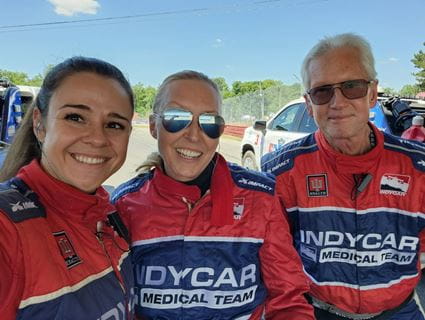 Newest to the field, McCarthy is a West Point graduate who was an officer in the U.S. Army and an executive of a military communications tech company before becoming a physician. A Milwaukee native, McCarthy grew up watching her brothers race go-karts and going to the Indy 500 every year since age 11 (the much-anticipated birthday which allowed this rite of passage in her family).
Newest to the field, McCarthy is a West Point graduate who was an officer in the U.S. Army and an executive of a military communications tech company before becoming a physician. A Milwaukee native, McCarthy grew up watching her brothers race go-karts and going to the Indy 500 every year since age 11 (the much-anticipated birthday which allowed this rite of passage in her family).
On several occasions traveling with INDYCAR over the last year, McCarthy has been part of all-women medical teams including Vaizer, Fiege, Rusk and female nurses.
“Sometimes when we travel with INDYCAR, I forget we’re an all-female team until someone says something,” McCarthy said. “We’re just people doing our jobs—people who like challenges and would get bored doing the same thing every day.”
Some like it hot
Emergency medicine attracts those who “thrive under pressure,” said Vaizer, and in motorsports medicine, “This is to the nth degree.” There are more than 60 “hot” days at the IMS track each year when races are running, and the NTT INDYCAR Series holds 17 races each season.
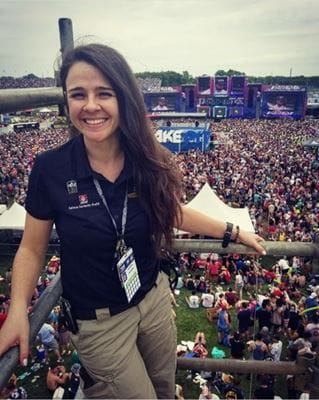 “When the track is hot, the cars keep going,” she said, noting that under “yellow flag” conditions, racecars might continue whizzing by at a “slow” 100 mph while the emergency care team is on the track assisting another driver.
“When the track is hot, the cars keep going,” she said, noting that under “yellow flag” conditions, racecars might continue whizzing by at a “slow” 100 mph while the emergency care team is on the track assisting another driver.
Vaizer’s first experience with INDYCAR was in Detroit during her intern year of residency when she volunteered as a roving medic for the Detroit Grand Prix. That’s where she met Billows.
“I told him my dream was to start a motorsports medicine fellowship one day, and he said, ‘me too.’ That’s how our friendship developed,” Vaizer recalled.
Billows had already started a Motorsports Medicine elective for senior medical residents at IU during the month of May. He invited Vaizer to participate.
“That was one of the best months of my life,” she said. “I spent every single waking moment at the track.”
After finishing her residency in Detroit and doing a short stint as an emergency medicine physician in Florida, Vaizer was accepted into the Emergency Medicine Fellowship at IU School of Medicine. When Billows’ newly developed Motorsports Medicine Fellowship came online, she decided to double up and take on both programs at once.
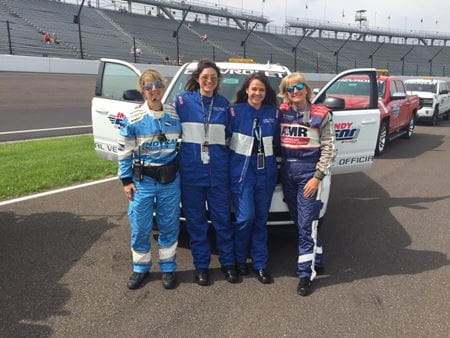 “I had so much fun and learned so much,” Vaizer said. “I was fortunate to have faculty, co-fellows and teachers who are now friends and colleagues that helped me become who I am today.”
“I had so much fun and learned so much,” Vaizer said. “I was fortunate to have faculty, co-fellows and teachers who are now friends and colleagues that helped me become who I am today.”
With her training, Vaizer is uniquely equipped for the role of INDYCAR medical director.
“I would argue that there is no other physician that is as well prepared as she is in terms of her educational background,” Fiege said. “Not only is her training important to her success, but Dr. Vaizer is very analytical, she makes great decisions, and she is able to see through the clutter to focus on the big picture. She is a gifted educator and is well respected by leadership of IU Health, IMS and those instrumental in motorsports medicine.”
The pioneers of motorsports medicine
Vaizer’s earliest exposure to motorsports was through motorcycle races. She watched her first Motocross race at 7 years old, and she was “hooked.” Attending her first MotoGP event in Barcelona as a young adult was unforgettable.
“I still remember that feeling—the vibration, the excitement of seeing the racing and hearing the engines roar and smelling motorcycles—that was awesome,” she said.
As a college student at the University of Florida, she bought a motorcycle for her commute to campus and joined a motorcycle safety club for students, faculty and staff.
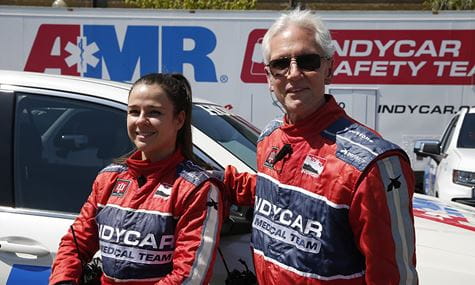 “I remember wondering how I could combine these two passions of mine,” Vaizer said. “By the time I was interviewing for residencies, I was able to articulate my vision that one day I wanted to start a motorsports medicine program; it turned out, I wasn’t the only one with that same kind of thought process.”
“I remember wondering how I could combine these two passions of mine,” Vaizer said. “By the time I was interviewing for residencies, I was able to articulate my vision that one day I wanted to start a motorsports medicine program; it turned out, I wasn’t the only one with that same kind of thought process.”
Not only has Vaizer stepped into Billows’ shoes at the speedway, but she also has assumed the role of director for the Motorsports Medicine program he developed at IU School of Medicine.
“It’s humbling,” Vaizer said. “There are moments I hesitate, and then I picture Dr. Billows saying, ‘You’ve got this.’ He is a brilliant man who has trained me to be here, and if he trusts me to do this job, then I know I can do it.”
Vaizer is proud to be forging the path for motorsports medicine to become a recognized subspecialty in emergency medicine.
“It’s an opportunity for us to standardize education and make sure that when people come out to provide care to racing series or events, they are equipped with the best knowledge and not just learning on-the-job like how it has been historically,” Vaizer said. “The Motorsports Medicine program provides the opportunity to have somebody guide them and share their knowledge, so when they come onto the care team, they are much stronger.”
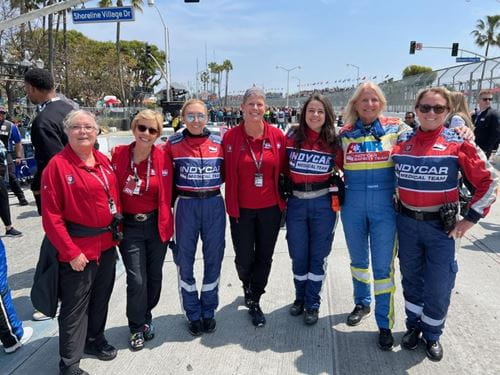 Motorsports medicine fellows train with a cadaver lab to learn how to rescue and extricate drivers from all types of racecars—even if that car is on fire.
Motorsports medicine fellows train with a cadaver lab to learn how to rescue and extricate drivers from all types of racecars—even if that car is on fire.
“We are constantly running those extrication drills for different scenarios—what if the driver is unconscious, what if the car is upside down,” McCarthy said. “And we cross-train with other racing series. Over the last year, I’ve been able to train with INDYCAR, Formula 1, NASCAR and international racing series.”
Another important aspect of motorsports medicine is working with engineers to improve safety in the cars and at the track. Amazingly, drivers often walk away from hitting the wall at 220 mph with no serious injuries due to advanced safety technology.
“You have to have a healthy degree of respecting the responsibility you have in this position,” Vaizer said.
As for the notoriety that comes with being the first woman to lead medical operations for auto racing’s biggest annual event, Vaizer is proud to represent. But she shies away from the limelight.
“I just like to get stuff done and make stuff happen,” she said.
